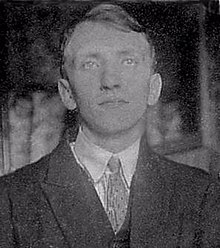Maurice Blanchot
| Maurice Blanchot | |
|---|---|
 |
|
| Born | 22 September 1907 Devrouze, Saône-et-Loire, France |
| Died | 20 February 2003 (aged 95) Le Mesnil-Saint-Denis, France |
| Alma mater | University of Strasbourg |
| Era | 20th-century philosophy |
| Region | Western Philosophy |
| School |
Continental philosophy Phenomenology of aesthetic experience |
|
Main interests
|
Philosophy of death Literary criticism Moral philosophy Political philosophy Philosophy of language |
|
Notable ideas
|
Le neutre (the Neutral) Right to death Two kinds of death (the first death is the actual event, situated within history; the second death is the pure form of the event, which never happens) |
Maurice Blanchot (French: [blɑ̃ʃo]; 22 September 1907 – 20 February 2003) was a French writer, philosopher, and literary theorist. His work had a strong influence on post-structuralist philosophers such as Jacques Derrida.
Little was known until recently about much of Blanchot's life, and he long remained one of the most mysterious figures of contemporary literature.
Blanchot was born in the village of Quain (Saône-et-Loire) on 22 September 1907. Blanchot studied philosophy at the University of Strasbourg, where he became a close friend of the Lithuanian-born French Jewish phenomenologist, Emmanuel Levinas. He then embarked on a career as a political journalist in Paris. From 1932 to 1940 he was editor of the mainstream, conservative daily the "Journal des débats". Early in the 1930s he contributed to a series of radical nationalist magazines, while also serving as editor of the fiercely anti-German daily "Le rempart" in 1933 and as editor of Paul Lévy's anti-Nazi polemical weekly "Aux écoutes". In 1936 and 1937 he also contributed to the far right monthly "Combat" and to the nationalist-syndicalist daily "L'Insurgé", which eventually ceased publication – largely as a result of Blanchot's intervention – because of the anti-semitism of some of its collaborators. There is no dispute that Blanchot was nevertheless the author of a series of violently polemical articles attacking the government of the day and its confidence in the politics of the League of Nations, and warned persistently against the threat to peace in Europe posed by Nazi Germany.
In December 1940, he met Georges Bataille, who had written strong anti-fascist articles in the thirties, and who would remain a close friend until his death in 1962. Blanchot worked in Paris during the Nazi occupation. In order to support his family, he continued to work as a book reviewer for the Journal des débats from 1941 to 1944, writing for instance about such figures as Sartre and Camus, Bataille and Michaux, Mallarmé and Duras for a putatively Pétainist readership. In these reviews he laid the foundations for later French critical thinking, by examining the ambiguous rhetorical nature of language, and the irreducibility of the written word to notions of truth or falsity. He refused the editorship of the collaborationist Nouvelle Revue Française, for which, as part of an elaborate ploy, he had been suggested by Jean Paulhan. He remained a bitter opponent of the fascist, anti-semitic novelist and journalist Robert Brasillach, who was the principal leader of the pro-Nazi collaborationist movement, and was active in the Resistance. In June 1944, Blanchot was almost executed by a Nazi firing squad (as recounted in his text The Instant of My Death).
...
Wikipedia
